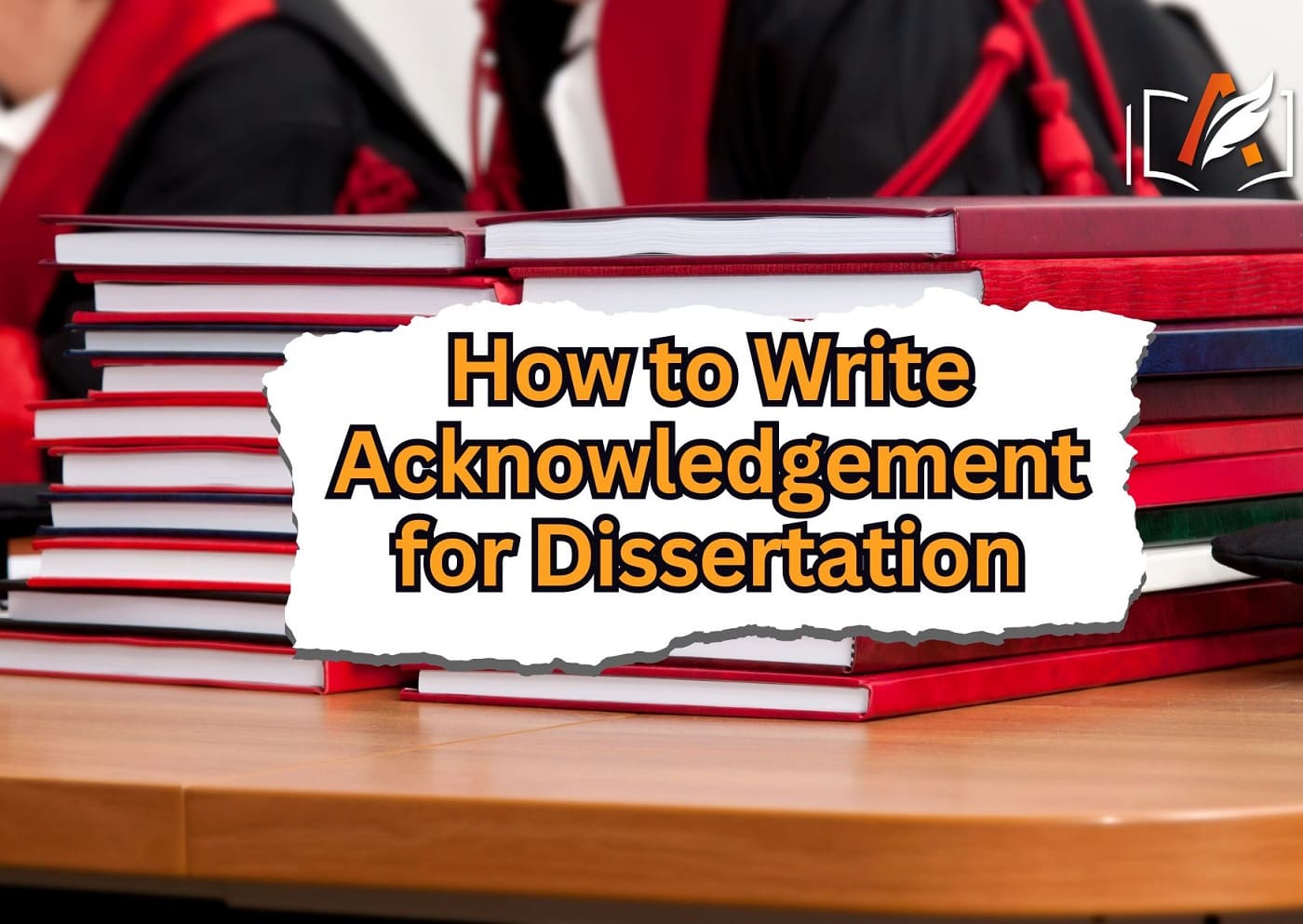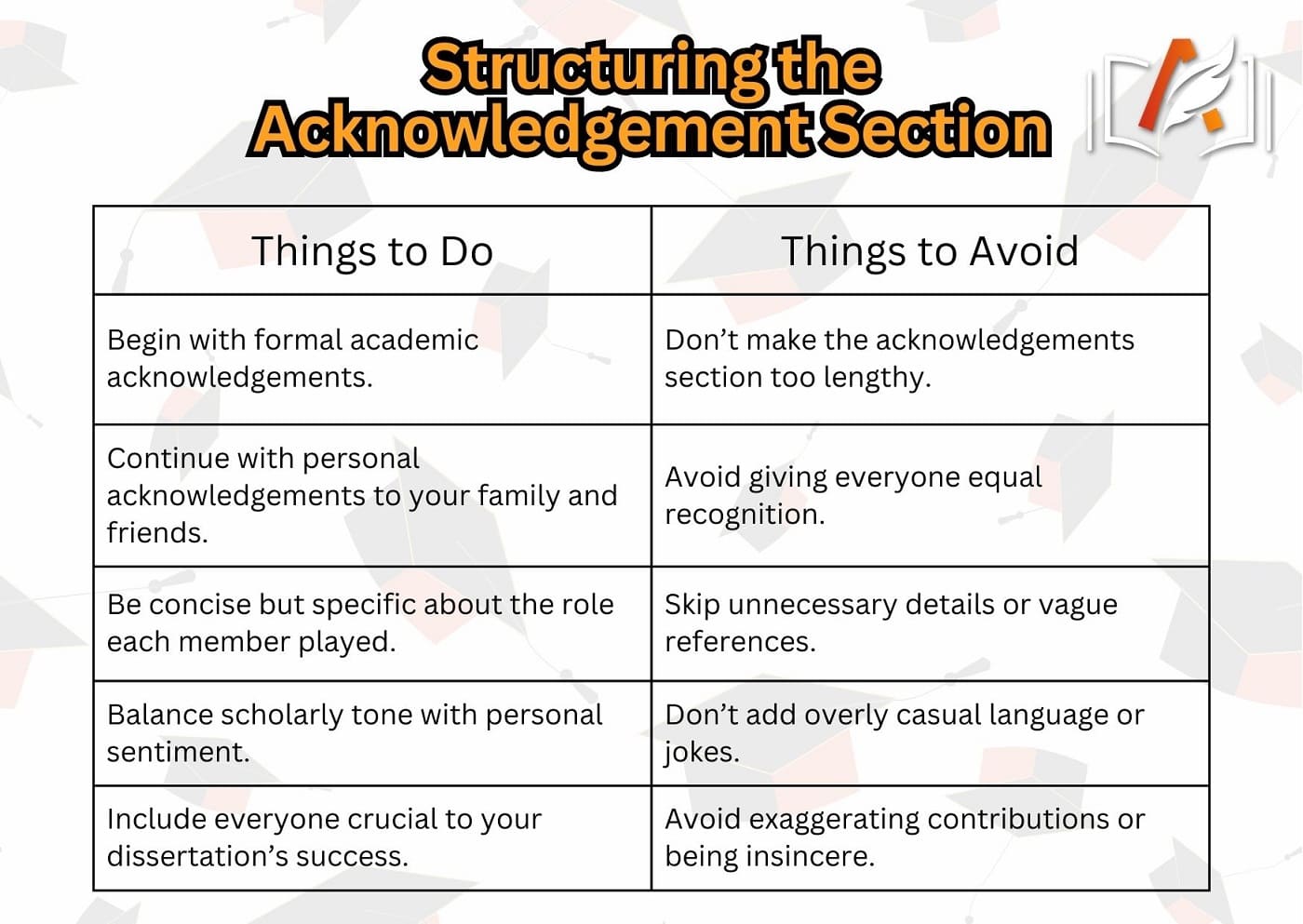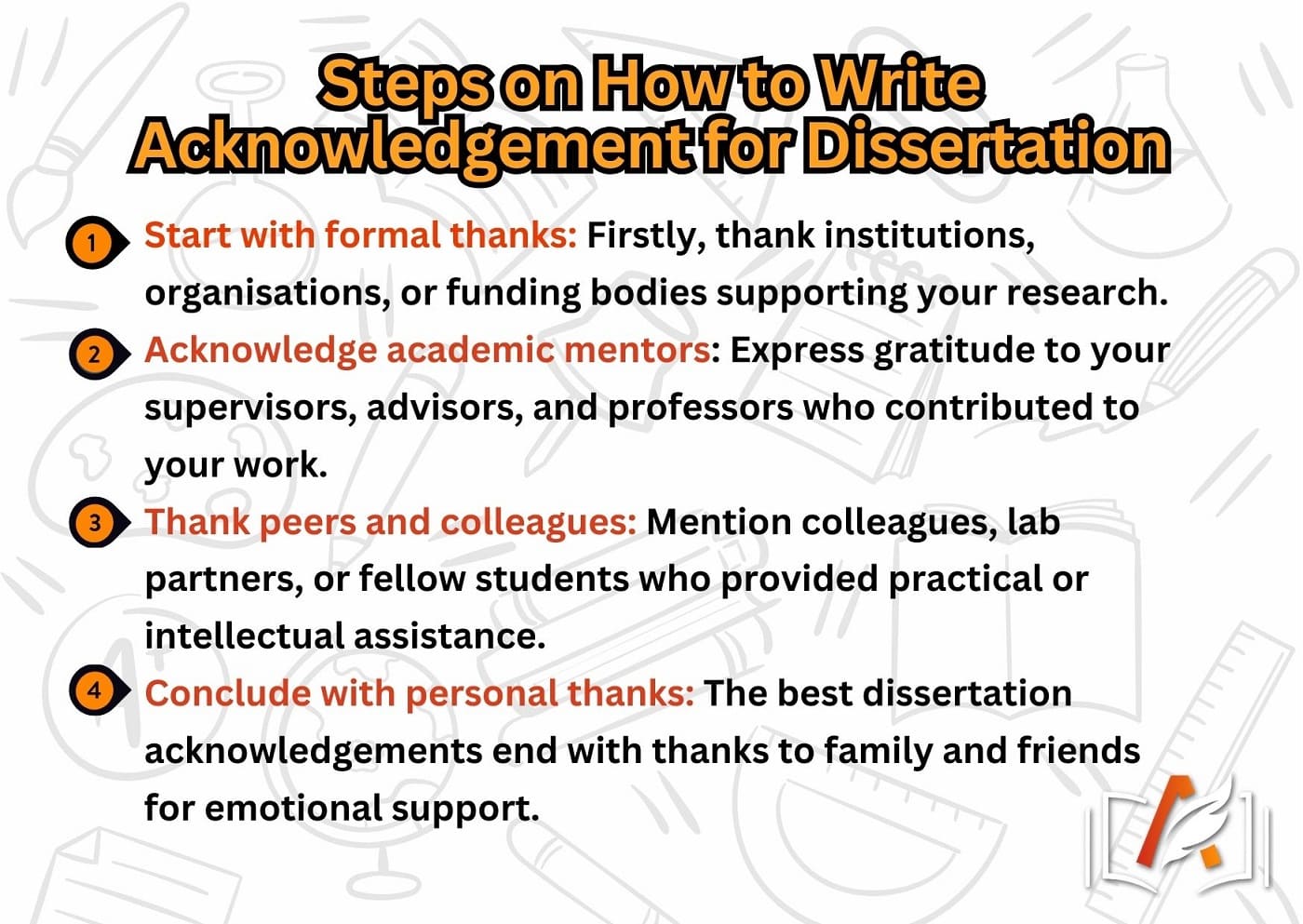 Ruby Butz
Ruby Butz

The acknowledgements section is a crucial part of a dissertation. It’s an excellent opportunity to express gratitude to people who made the dissertation possible, including your advisor, family, or friends. This article discusses the importance of the acknowledgements part, its structure, style, position, writing tips, and examples. It’ll give you a clear idea of how to write an acknowledgement for a dissertation that reflects your academic journey.
How to Write Meaningful Acknowledgements
The acknowledgement section enables students to show appreciation to the team of people who supported them while writing this complex work. In this part of the dissertation, you should avoid using an overly formal tone and sincerely thank everyone who kept you motivated. The aim is to give credit to everyone, from academic mentors to your nearest and dearest, who helped you complete the research. With this slight personal touch in your dissertation, you show readers that this hard work wasn’t done alone.
Making Plans for Your Acknowledgement
When writing acknowledgements in dissertation projects, reflect on the people who collaborated with you. If you want, prioritise the order of listing the individuals and organisations that contributed to your work. The list can include your academic advisor, committee members, family, friends, and organisations that provided funding or other resources.
For example, you may start with those directly impacting your research, then mention people offering emotional support. This section doesn’t have to be extended: write brief sentences showing genuine gratitude. Students seeking help structuring or phrasing their acknowledgements can delegate some tasks to the thesis writing service at StateOfWriting. We provide expert assistance to ensure this part of your dissertation is professionally crafted.
Structuring the Acknowledgement Section
There are several crucial aspects to do and avoid when writing your acknowledgements. If you need professional guidance crafting this essential part of your dissertation and need a high-quality acknowledgements dissertation example, consider using essay writing assistance. Expert writers will help you structure the acknowledgement section and refine your dissertation.
Things to Do:
- Begin with formal academic acknowledgements to supervisors, professors, and funding bodies.
- Continue with personal acknowledgements to your family and friends.
- Be concise but specific about the role each member played.
- Balance scholarly tone with personal sentiment.
- Include everyone crucial to your dissertation’s success.
Things to Avoid:
- Don’t make the acknowledgements section too lengthy.
- Avoid giving everyone equal recognition.
- Skip unnecessary details or vague references.
- Don’t add overly casual language or jokes.
- Avoid exaggerating contributions or being insincere.
Adhere to this structure to make your acknowledgements clear, concise, and sincere without being excessive.

Writing Acknowledgement for Dissertation: Style and Tone
The acknowledgements section requires a unique combination of formal and informal writing. It ensures you sound professional when showing your genuine gratitude. Thanking scholars, mentors or institutions, you must maintain academic professionalism. As you move to the family and friends section, you can employ a more personal tone without being overly casual. This section gives a little glimpse into your personality, so don’t sound cold and distant. Stay professional, even when giving personal thanks, and avoid clichés and colloquialisms. Here are some valuable tips if you are bothered about how to write acknowledgement in dissertation projects to achieve the right tone and style:
- Use active voice: To sound more engaging and sincere, use direct language in acknowledgements, such as "I thank" or "I am grateful to."
- Be specific: Acknowledge specific contributions from each person or organisation.
- Stay professional: Keep the tone academically appropriate and avoid casual language.
- Avoid overused expressions: Use your words instead of generic phrases to make your gratitude personal and unique.
With these pieces of advice, you can balance heartfelt thanks and formality in your acknowledgements.
Many students have trouble choosing the right style and time for this dissertation section. That is why they buy dissertation writing from qualified authors who ensure the acknowledgements meet formal standards and express genuine gratitude.
Where to Place the Acknowledgement in Your Dissertation
Most British universities require the dissertation acknowledgement page placed at the beginning of your work. It allows students to express their gratitude before delving into the academic content. The acknowledgement section usually goes immediately after the title page and before the abstract or table of contents. It highlights the contributions of people who supported your research. You should always check the specific guidelines of your university before writing this section. However, the general rule is to place it early and format it consistently. For additional assistance, you can get professional help with writing dissertation chapters online. Experts can provide valuable support in crafting the acknowledgement part, ensuring your work meets academic standards.
Steps on How to Write Acknowledgement for Dissertation
Writing your acknowledgement section may seem simple, but by following a step-by-step guide, you can make this section structured and meaningful:
1. Start with formal thanks: Firstly, thank institutions, organisations, or funding bodies supporting your research.
Example: "I am grateful to [University/Organization] for their financial and academic support throughout my research."
2. Acknowledge academic mentors: Express gratitude to your supervisors, advisors, and professors who contributed to your work.
Example: "I would like to express my sincere gratitude to Professor [Name] for their continuous support."
3. Thank peers and colleagues: Mention colleagues, lab partners, or fellow students who provided practical or intellectual assistance.
Example: "I appreciate the support of my fellow researchers, [Names], for their valuable feedback."
4. Conclude with personal thanks: The best dissertation acknowledgements end with thanks to family and friends for emotional support.
Example: "Finally, I am deeply thankful to my family and friends, especially [Name], for their endless encouragement."
When writing your acknowledgement in the dissertation, you must appreciate those who supported you throughout the research process. Start by thanking institutions and academic mentors, then mention colleagues, family, or friends. Make sure to keep the tone formal while also being personal, specific, and sincere. When done correctly, the acknowledgements show appreciation and add a personal touch to your academic paper.

Acknowledgement Example
It's essential to balance formal expressions of gratitude and personal thanks in your dissertation’s acknowledgement section. Look at an acknowledgements sample that meets the rules of traditional academic discourse:
"I am greatly indebted to [University Name] and [Funding Organization] for their financial and academic assistance with my project. Most of all, I acknowledge my supervisor, Professor [Name], for their valuable comment and directions. This work would not have been possible without their support.
I also want to give special thanks to my colleagues [Names] for their feedback and supportive remarks throughout the challenging phases of this project. Finally, I want to thank my family and friends, especially [Name], for their encouragement and patience, without which this process would have been far more complex."
FAQs
1. What is the format of writing an Acknowledgement?
If you wonder how to write dissertation acknowledgements, follow a clear structure. It starts with a formal gratitude to some essential academic institutions, funding bodies, and educational supervisors. Thanks to peers and colleagues should be followed by genuine appreciation to family and friends. Your acknowledgement section should be short, clear, precise, and well-organised.
2. How long can dissertation acknowledgements be?
A dissertation acknowledgement should be one page in length. As with any length associated with a written work, quality is more important than quantity. It needs to be long enough but not too detailed. Don’t be verbose but include every person who contributed to your success.
3. How do you start an acknowledgement paragraph?
If you are a student seeking an answer on how to write acknowledgements for dissertation papers, begin with thanks to formal entities. These can be public institutions or funding bodies involved in your research. For example, “I would like to express my gratitude to [Institution/Organization] for their support throughout my research”.
4. What is the difference between dedication and acknowledgement in a dissertation?
Dedication is an optional section where you emotionally devote your work to someone significant. On the contrary, the acknowledgement section is used to formally thank those who have supported your academic journey. These sections are both placed at the beginning of a dissertation but differ in tone and aim. The dedication is personal and emotional, while the acknowledgement is formal and appreciative.

Meet Ruby Butz, the accomplished author at the StateOfWriting educational blog. With a Master’s in English Literature, notable articles, and extensive teaching experience, she has helped thousands of students develop strong writing skills.
Writers are verified and tested to comply with quality standards.
Work is completed in time and delivered before deadline.
Wide range of subjects and topics of any difficulty covered.
Client id #: 000410
Paper type: CourseworkAll was completed just as I wanted. Excellent support - Big thanks to all of you 🙏🤗
Client id #: 000398
Paper type: Research paperFrom my experience, StateOfWriting excels in quality and service. My paper was well-researched, unique, and expertly written. Many thanks!
Client id #: 000402
Paper type: Research paperI found this service online, ordered the research, and within eight hours I had my paper ready. And the price was great - thank you!